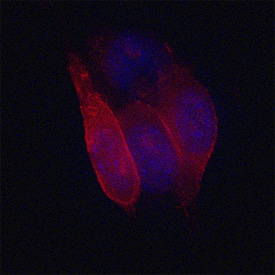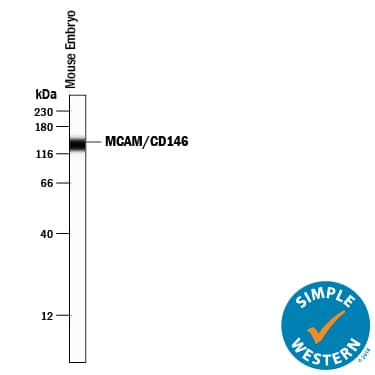Mouse MCAM/CD146 Antibody
R&D Systems, part of Bio-Techne | Catalog # AF6106

Key Product Details
Species Reactivity
Validated:
Cited:
Applications
Validated:
Cited:
Label
Antibody Source
Product Specifications
Immunogen
Val24-Tyr563
Accession # Q8R2Y2
Specificity
Clonality
Host
Isotype
Scientific Data Images for Mouse MCAM/CD146 Antibody
Detection of Human and Mouse MCAM/CD146 by Western Blot.
Western blot shows lysates of Bowes human melanoma cell line and mouse embryo tissue. PVDF Membrane was probed with 1 µg/mL of Sheep Anti-Mouse MCAM/CD146 Antigen Affinity-purified Polyclonal Antibody (Catalog # AF6106) followed by HRP-conjugated Anti-Sheep IgG Secondary Antibody (Catalog # HAF016). A specific band was detected for MCAM/CD146 at approximately 117 kDa (as indicated). This experiment was conducted under reducing conditions and using Immunoblot Buffer Group 8.MCAM/CD146 in B16‑F1 Mouse Cell Line.
MCAM/CD146 was detected in immersion fixed B16-F1 mouse melanoma cell line using Sheep Anti-Mouse MCAM/CD146 Antigen Affinity-purified Polyclonal Antibody (Catalog # AF6106) at 1.7 µg/mL for 3 hours at room temperature. Cells were stained using the NorthernLights™ 557-conjugated Anti-Sheep IgG Secondary Antibody (red; Catalog # NL010) and counterstained with DAPI (blue). Specific staining was localized to plasma membranes. View our protocol for Fluorescent ICC Staining of Cells on Coverslips.Detection of Mouse MCAM/CD146 by Simple WesternTM.
Simple Western lane view shows lysates of mouse embryo tissue (15 d.p.c.), loaded at 0.2 mg/mL. A specific band was detected for MCAM/CD146 at approximately 138 kDa (as indicated) using 10 µg/mL of Sheep Anti-Mouse MCAM/CD146 Antigen Affinity-purified Polyclonal Antibody (Catalog # AF6106) followed by 1:50 dilution of HRP-conjugated Anti-Sheep IgG Secondary Antibody (Catalog # HAF016). This experiment was conducted under reducing conditions and using the 12-230 kDa separation system.Applications for Mouse MCAM/CD146 Antibody
Immunocytochemistry
Sample: Immersion fixed B16‑F1 mouse melanoma cell line
Simple Western
Sample: Mouse embryo tissue (15 d.p.c.)
Western Blot
Sample: Bowes human melanoma cell line and mouse embryo tissue
Reviewed Applications
Read 1 review rated 4 using AF6106 in the following applications:
Formulation, Preparation, and Storage
Purification
Reconstitution
Formulation
Shipping
Stability & Storage
- 12 months from date of receipt, -20 to -70 °C as supplied.
- 1 month, 2 to 8 °C under sterile conditions after reconstitution.
- 6 months, -20 to -70 °C under sterile conditions after reconstitution.
Background: MCAM/CD146
MCAM (Melanoma cell adhesion molecule; also CD146 and MUC18) is a 110‑120 kDa member of a small group of Ig‑superfamily molecules that includes CD239 and CD166. MCAM has also been reported at a molecular weight of approximately 150 kDa. In rodent, MCAM is reportedly expressed on neurons, endothelial cells, NK cells, neutrophils, mesenchymal stem cells and melanoma cells. MCAM appears to contribute to intercellular endothelial cell junctions, and possibly contributes to the migration of select cell types. Mature mouse MCAM is a 625 amino acid (aa) type I transmembrane glycoprotein. Its extracellular region is 540 aa in length (aa 24‑563). It contains two V‑type Ig‑like domains (aa 24‑244) followed by three C2‑type Ig‑like domains (aa 246‑512). One cytoplasmic region splice form shows a seven aa substitution for aa 600‑648. Unlike human, rodent MCAM does not undergo a splicing event that will generate a soluble isoform. Over aa 24‑563, mouse MCAM shares 90% and 74% aa identity with rat and human MCAM, respectively.
Long Name
Alternate Names
Gene Symbol
UniProt
Additional MCAM/CD146 Products
Product Documents for Mouse MCAM/CD146 Antibody
Product Specific Notices for Mouse MCAM/CD146 Antibody
For research use only



